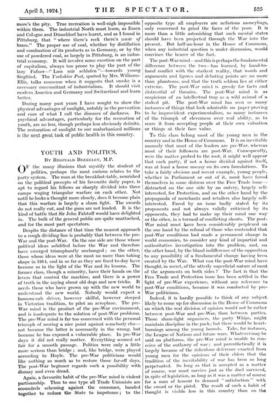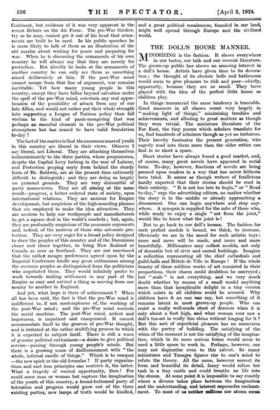YOUTH AND POLITICS.
BY REGINALD BERKELEY, M.P.
OF the many illusions that mystify the student of politics, perhaps the most curious relates to the party system. The man at the breakfast-table, nourished on the political precepts of his favourite daily paper, is apt to regard his fellows as sharply divided into three camps waging triangular warfare on each other. Not until he looks a thought more closely, does it become plain that this warfare is largely a sham fight. The swords do not really cut, and the guns are not loaded. It is the kind of battle that Sir John Falstaff would have delighted in. The bulk of the general public are quite unattached, and for the most part spectators.
Despite the distance of that time the nearest approach to a rough dividing line is probably that between the pre- War and the post-War. On the one side are those whose political ideas solidified before the War and therefore have emerged triumphantly unchanged ; on the other, those whose ideas were at the most no more than taking shape in 1914, and in so far as they are fixed to-day have become so in the light of the War and its lessons. The former class, though a minority, have their hands on the levers that control the machine, and there is a power of truth in the saying about old dogs and new tricks. It needs those who have grown up with the new world to understand the new world. Nobody would expect a hansom-cab driver, however skilful, however steeped in Victorian tradition, to pilot an aeroplane. The pre- War mind is the product of the pre-War environment, and is inadequate to the solution of post-War problems. The pre-War mind is far too concerned with the personal triumph of scoring a nice point against somebody else— not because the latter is necessarily in the wrong, but because he has exposed a vulnerable place. In Fe-War days it did not really matter. Everything seemed set fair for a smooth passage. Politics were only a little more serious than bridge ; and, like bridge, were played according to Hoyle. The pre-War politicians would like nothing so much as to restore those far-off days. The post-War beginner regards such a possibility with dismay and even dread.
Again, a favourite habit of the pre-War mind is violent partisanship. Thus to one type all Trade Unionists are scoundrels scheming against the consumer, banded together to reduce the State to impotence ; to the opposite type all employers are nefarious moneybags, only concerned to grind the faces of the poor. It is more than a little astonishing that such mental states should have been projected through the War into the present. But half-an-hour in the House of Commons, when any industrial question is under discussion, would convince the hearer of the fact.
The post-War mind—and this is perhaps the fundamental difference between the two—has learned, by hand-to- hand conflict with the starkest reality, that words and arguments and figures and debating points are no more than phantoms, and that the truth seldom lies at either extreme. The post-War mind is greedy for facts and distrustful of theories. The post-War mind is as suspicious of an intellectual trap as a wild animal of a staked pit. The post-War mind has seen so many instances of things that look admirable on paper proving to be improvident experimentalism, so many instances of the triumph of cleverness over real ability, as to scare it from accepting people at their own valuation or things at their face value.
To this class belong most of the young men in the country and in the House of Commons. It is an inevitable anomaly that most of the leaders are pre-War, whereas most of their followers are post-War. Consequently, were the matter probed to the root, it might well appear that each party, if not a house divided against itself, was at least a house uneasy on its own foundations. To take a fairly obvious and recent example, young people, whether in Parliament or out of it, must have found themselves in some distress over the Free Trade issue— distracted on the one side by an outcry, largely self- interested, for Protection, and on the other hand by the propaganda of merchants and retailers also largely self- interested. Faced by an issue badly stated by its proponents and not always validly criticized by its opponents, they had to make up their mind one way or the other, in a turmoil of conflicting shouts. The post- War mind must have been considerably perplexed on the one hand by the refusal of those who contended that post-War conditions had made a permanent change in world economics, to consider any kind of impartial and authoritative investigation into the problem, and, on the other hand, by the bland indifference of the opposition to any possibility of a fundamental change having been created by the War. What can the post-War mind have thought, in secret, of the utterly superficial nature of most of the arguments on both sides ? The fact is that the Free Trade and Protection issue has been settled in the light of pre-War experience, without any reference to post-War conditions, because it was conducted by pre- War politicians.
Indeed, it is hardly possible to think of any subject likely to come up for discussion in the House of Commons on which the real division of opinion would not be rather between post-War and pre-War, than between parties. Those sham-fight organizers, the party Whips, might maintain discipline in the pack; but there would be heart- burnings among the young hounds. Take, for instance, the League of Nations and future wars. Whatever may be said on platforms, the pre-War mind is unable to con- ceive of the outlawry of war ; and parenthetically it is largely because of the ridiculous deference exacted from young men for the opinions of their elders that the tradition of the inevitability of war has been so long perpetuated. So long as that is accepted as a matter of course, war must survive just as the duel survived, in spite of legislation, as long as it was a matter of course for a man of honour to demand . " satisfaction." with the sword or the pistol. The result of such a_ habit of thought is visible less in this country than on the Continent, but evidence of it was very apparent in the recent Debate on the Air Force. The pre-War thinker, try as he may, cannot get it out of his head that arma- ments are built to be used. In his public speeches he is more likely to talk of them as an illustration of the old maxim about wishing for peace and preparing for war. When he is discussing the armaments of his own country he will always say that they are merely for protection. But directly he looks at the armaments of another country he can only see them as something aimed deliberately at him. If the post-War mind cannot escape from that line of argument, war remains inevitable. Yet how many young people in this country, except they have fallen beyond salvation under the spell of the pre-War mind, entertain any real appre- hension of the possibility of attack from any of our late Allies, and would not rather put their whole strength into supporting a League of Nations policy than fall victims to the kind of panic-mongering that was perhaps an essential element in the pre-War political atmosphere but has ceased to have valid foundation to-day ?
The fact of the matter is that the enormous mass of youth in this country are liberal in their views. Observe I say liberal, not Liberal. They are attaching themselves indiscriminately to the three parties, whose programmes, despite the Capital Levy lurking in the rear of Labour, and Protection peeping coyly from behind the sturdy form of Mr. Baldwin, are at the present time extremely difficult to distinguish; and they are doing so largely on personal grounds. They are very distrustful of party manoeuvres. They are all aiming at the same result—progress, a better ordered state of society, open international relations. They are anxious for Empire development, but suspicious of the high-sounding phrases that are employed to make the idea attractive. They are anxious to help our workpeople and manufacturers to get a square deal in the world's markets ; but, again, they are profoundly suspicious of the economic arguments and, indeed, of the motives of those who advocate pro- tection. They are very eager for a broad policy designed to draw the peoples of this country and of the Dominions closer and closer together, to bring New Zealand or Canada as near as Scotland. They are not convinced that the rather meagre preferences agreed upon by the Imperial Conference kindle any great enthusiasm among the overseas peoples as distinguished from the politicians who negotiated them. They would infinitely prefer to work towards making settlement in any part of the Empire as easy and natural a thing as moving from one county to another in England.
And yet, what hope is there of achievement ? When all has been said, the fact is that the pre-War mind is indifferent to, if not contemptuous of, the working of the post-War mind ; and the pre-War mind controls the social machine. The post-War mind, ardent and impetuous, is impatient and exasperated. It cannot accommodate itself to the grooves of pre-War thought, and is irritated at the rather stultifying process to which it is expected to subject itself. There is still a wave of genuine political enthusiasm—a desire to give political service—passing through young people's minds. But there is a growing sense of disillusionment with " the whole, infernal caudle of things." Which is to conquer the new spirit or the old formulas ? If party organiza- tions and cast iron principles can contrive it, the latter. What a tragedy of wasted opportunity, then ! For could sonic man or woman but capture the imagination of the youth of this country, a broad-bottomed party of toleration and progress would grow out of the three existing parties, new lamps of truth would be kindled, and a great political renaissance, founded in our land, might well spread through Europe and the civilized world.



























































 Previous page
Previous page